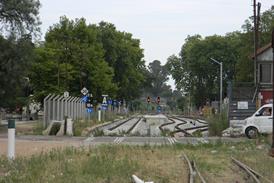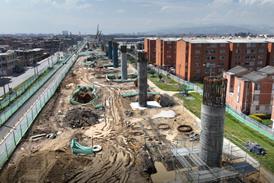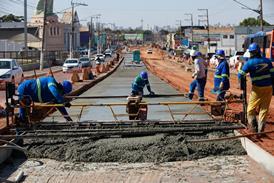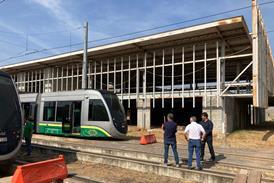Retirement of General Manager Alvord Mabena earlier this year and his replacement by Mr S Zumbika as Acting GM was followed by a rethink of the way in which National Railways of Zimbabwe will be privatised. The principle of separate infrastructure and operations has now been rejected in favour of several vertically integrated concessions. Zumbika says that line closures are not on the agenda, and that each concession will be offered as a package consisting of both
main and branch lines.
For certain international routes such as the Beira corridor there appears to be merit in offering a single concession for the entire route, including the section of line in a neighbouring country, and perhaps the port as well, but Zumbika thinks this unlikely.
All concessions will be for freight traffic only, with operation of passenger services remaining, at least in the short term, the responsibility of the residual NRZ.
NRZ has been investing heavily in infrastructure improvements. The African Development Bank has provided Z$273m to upgrade signalling and communications on the Harare - Mutare line, and this work is now complete. Work is progressing on a similar Z$185m project for the Dabuka - Bulawayo line, this time with funds from the World Bank. Chief benefits are the replacement of vandal-prone copper wire with a digital microwave system, provision of a full voice radio network, and protection against system failures caused by power shortages.
Beitbridge - Bulawayo Railway starts running
BBR commenced operations on May 15 1999, taking over the existing cement traffic from Colleen Bawn on NRZ’s former West Nicholson branch. The newly constructed 150 km section of line completing the link to Beitbridge opened to traffic on July 15. Upgrading of the 147 km Heany Junction - Colleen Bawn section to accept 18·5 tonne axleloads is continuing.
The new line has been constructed at a cost of Z$1.4bn under a 30-year BOT concession. Spoornet has been contracted to operate the line on behalf of BBR, although shunting at Beitbridge and Mpopoma (Bulawayo) is performed by NRZ under contract to Spoornet or BBR.
Construction of the BBR has given Botswana Railways considerable cause for concern over the potential diversion of transit traffic on which it depends so heavily. Agreements are now in place between the various railways to the effect that all traffic should use the shortest route. Thus traffic from Bulawayo and beyond may use either the BR or BBR route, depending on its destination in South Africa, while most traffic from Dabuka and beyond, except that destined for the Cape, will continue to use the Rutenga route.
CAPTION: NRZ has launched a daytime passenger service between Bulawayo and Harare. Formed of new air-conditioned coaches, the train is seen here leaving Bulawayo




















